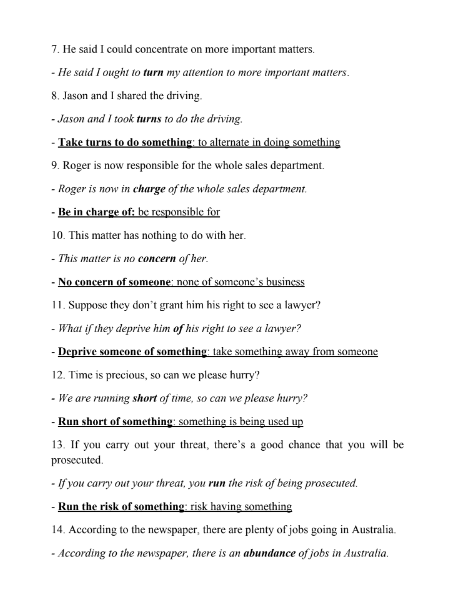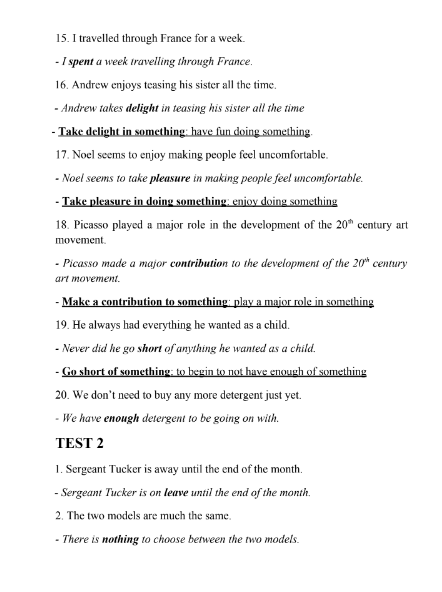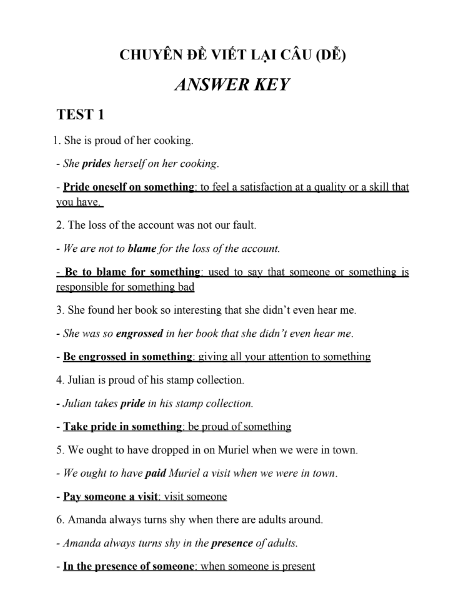


Mục lục
ToggleTEST 1
- She is proud of her cooking.
- She prides herself on her cooking.
- Pride oneself on something : to feel a satisfaction at a quality or a skill that you have.
- The loss of the account was not our fault.
- We are not to blame for the loss of the account.
- Be to blame for something : used to say that someone or something is responsible for something bad.
- She found her book so interesting that she didn’t even hear me.
- She was so engrossed in her book that she didn’t even hear me.
- Be engrossed in something : giving all your attention to something.
- Julian is proud of his stamp collection.
- Julian takes pride in his stamp collection.
- Take pride in something : be proud of something.
- We ought to have dropped in on Muriel when we were in town.
- We ought to have paid Muriel a visit when we were in town.
- Pay someone a visit : visit someone.
- Amanda always turns shy when there are adults around.
- Amanda always turns shy in the presence of adults.
- In the presence of someone : when someone is present.
- He said I could concentrate on more important matters.
- He said I ought to turn my attention to more important matters.
- Jason and I shared the driving.
- Jason and I took turns to do the driving.
- Take turns to do something : to alternate in doing something.
- Roger is now responsible for the whole sales department.
- Roger is now in charge of the whole sales department.
- Be in charge of: be responsible for.
- This matter has nothing to do with her.
- This matter is no concern of her.
- No concern of someone : none of someone’s business.
- Suppose they don’t grant him his right to see a lawyer?
- What if they deprive him of his right to see a lawyer?
- Deprive someone of something : take something away from someone.
- Time is precious, so can we please hurry?
- We are running short of time, so can we please hurry?
- Run short of something : something is being used up.
- If you carry out your threat, there’s a good chance that you will be prosecuted.
- If you carry out your threat, you run the risk of being prosecuted.
- Run the risk of something : risk having something.
- According to the newspaper, there are plenty of jobs going in Australia.
- According to the newspaper, there is an abundance of jobs in Australia.
- I travelled through France for a week.
- I spent a week travelling through France.
- Andrew enjoys teasing his sister all the time.
- Andrew takes delight in teasing his sister all the time.
- Take delight in something : have fun doing something.
- Noel seems to enjoy making people feel uncomfortable.
- Noel seems to take pleasure in making people feel uncomfortable.
- Take pleasure in doing something : enjoy doing something.
- Picasso played a major role in the development of the 20th century art movement.
- Picasso made a major contribution to the development of the 20th century art movement.
- Make a contribution to something : play a major role in something.
- He always had everything he wanted as a child.
- Never did he go short of anything he wanted as a child.
- Go short of something : to begin to not have enough of something.
- We don’t need to buy any more detergent just yet.
- We have enough detergent to be going on with.
TEST 2
- Sergeant Tucker is away until the end of the month.
- Sergeant Tucker is on leave until the end of the month.
- The two models are much the same.
- There is nothing to choose between the two models.
- David should concentrate more on his studies.
- David should apply himself more to his studies.
- If he continues to be rude to her, she’s going to give him a piece of her mind.
- If he persists in being rude to her, she’s going to give him a piece of her mind.
- It’s really worth knowing people in high places sometimes.
- It pays to know people in high places sometimes.
- Your father will never allow you to marry Alec.
- Your father will never give his consent to your marrying Alec.
- Give consent to something : approve of something.
- Judging by the outside of the house, very rich people live here.
- By the look of the outside of the house, very rich people live here.
- That the socialists won the election was totally unexpected.
- The socialists’ winning the election came as a surprise.
- The police will keep him in custody until they have proof he is not a terrorist.
- He will not be set free until they have proof he is not a terrorist.
- Women all over the world copied the Princess Diana look.
- Princess Diana set a trend that women all over the world copied.
- Many people do not approve of the new measures to control crime.
- Few people go along with the new measures to control crime.
- Go along with something : approve of something.
- If only I could read music.
- I would love to be able to read music.
- It is very difficult to stay up-to-date with technology.
- It is very difficult to keep pace with technology.
- Keep pace with something : to go as fast as something.
- Apparently we‘ll have to start from scratch.
- By the looks of it, we‘ll have to start from scratch.
- A lot of people have been talking about his new film lately.
- His new film has been the subject of much debate lately.
- Be the subject of something : the main topic of something.
- At first sight, it seems like a worthwhile plan of attack, but we’ll see.
- On the face of it, it seems like a worthwhile plan of attack, but we’ll see.
- Very few employees agree with the new proposals.
- Very few employees are in favor of the new proposals.
- They blamed her for the error, even though she had been absent at the time.
- She was held responsible for the error, even though she had been absent at the time.
- Be held responsible for something : be blamed for something.
- I think this difficult situation will resolve itself after a while.
- I think this difficult situation will sort itself out after a while.
- Sort something/somebody out : to deal successfully with a problem.
- If my mother calls, tell her I’m on my way home.
- Should my mother happen to call, tell her I’m on my way home.
TEST 3
- She damaged the car badly when she backed into the tree.
- She did great damage to the car when she backed into the tree.
- These old laws should be abolished.
- These old laws should be done away with.
- Be done away with : be abolished, eliminated.
- It’s such a shame that Terry and Carla broke up.
- If only Terry and Carla hadn’t gone their separate ways.
- Judy‘s thinking about moving to France.
- Judy’s giving some thought to moving to France.
- There are several categories of people who do not have to pay the new tax.
- There are several categories of people who are exempt from paying the new tax.
- Terry did not agree with me about the best way to proceed.
- Terry did not share my views on the best way to proceed.
- It seems highly unlikely that the weather will improve during the next few days.
- The weather shows no signs of improvement during the next few days.
- The open-air concerts in the park take place on alternate Sundays.
- The open-air concerts in the park take place every other Sunday.
- John was quite frank about his criminal record.
- John made no secret of his criminal record.
- Our bus timetable may vary from one month to the next.
- Our bus timetable is subject to monthly change.
- There have been a lot of redundancies in that area.
- A lot of jobs have been lost in that area.
- The number of places offered on the course has been drastically reduced owing to lack of funds.
- Lack of funds has led to a drastic reduction in the number of places offered on the course.
- Doesn’t anyone but me care about this issue?
- Am I the only one who cares about this issue?
- I was amazed at the speed with which Chris learned to drive.
- I found it amazing how quickly Chris learned to drive.
- When you go to the city, watch out for pickpockets.
- When you go to the city, be on the lookout for pickpockets.
- Be on the lookout for something : to be watching carefully in order to find, obtain or avoid something.
- Several flights have had to be cancelled because of heavy snowfalls.
- Heavy snowfalls have resulted in the cancellation of several flights.



